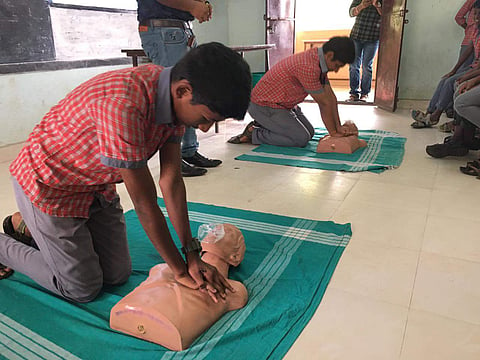

Dear reader, when you’re done skimming through this article, it is your responsibility to see if the Foundation for Development Action's (FDA) mission will endure. These are words borrowed from Ramesh Krishnan, Executive Director of the organisation. To put it simply, theirs is a mission that has been kept afloat thanks to public interest and a focus on sustainability since 1955. Decades later, their vision for a safer society through the collective work of young professionals in the field of social work, law and healthcare continues to depend on the same sentiment.
The focus is on four key areas: Disaster Risk Reduction (DRR), Child Development, Livelihoods and Capacity Building. Ramesh, who has two decades of work experience in the developmental sector through projects with the World Bank and UNDP, says, “Our intention is to partner with vulnerable communities to shape a disaster-resilient society and to ensure that every child has the opportunity to live a life with dignity.”
Building a safe campus
In a changing world where climate change and disasters have grown unpredictable, the FDA has been focused on preparing our youngest citizens to fight back and survive. This was done through a series of awareness programmes on campus safety and the basics of DRR which includes the classification of terminologies like hazard, vulnerabilities, risk, capacity, prevention, mitigation, preparedness, response and recovery. Their work towards making schools safe in the event of disasters began in 2015. In association with SOS Children’s Village in Thrissur, they organised a two-day sensitisation workshop on the ‘Basics of Disaster Management’ with around 50 children. Ramesh says, “On day 1, pre-tests were conducted among core students to know their level of understanding on various aspects of DRR and they were divided into groups for a Hazard Hunt. One day 2, inputs on Participatory Learning and Appraisals (PLA) were introduced with the help of campus staff.”
Over the next few years, the programme was adapted to different schools across the state including Saraswathi Vidyalaya in Thiruvananthapuram where they implemented a comprehensive School Safety Programme following the National School Safety Policy Guidelines. “It was the first of its kind in Kerala. Saraswathi Vidyalaya is a gigantic educational complex consisting of 3,334 students. The aim was to prepare the school management for any natural or human-induced disaster,” he says. In December 2019, the organisation implemented the School Safety Programme in 28 schools in 14 districts of Kerala as part of the 2018 flood recovery programme. It was rolled out in association with the United Nations Development Programme (UNDP), Kerala State Disaster Management Authority (KSDMA) and the General Education Department of Kerala.
Developing a child’s world
It was in 2017, that the FDA lent a hand to child development in the state. With the Kaval Project, which literally means ‘to guard’, the aim was to provide psycho-social support to children in conflict with the law, in association with the state’s Social Justice Department and National Institute of Mental Health and Neurosciences (NIMHANS) in Bengaluru. After November 2017, Kaval was transferred to the Women and Child Development Department. “FDA is reaching out to children in their own communities and is providing numerous services for behavioural modification through counselling, life skill education and group work exercises,” says Ramesh, “We also offer support services including de-addiction, legal services, vocational education and skilling. Services for a child are determined based on the Individual Care Plan which is prepared after a series of consultations and counselling sessions with children as well as their parents.”
He continues, “Recent studies show that school children and adolescents are increasingly becoming victims of drug addiction. In February 2018, we launched a project piloted in 20 hotspot schools in Thiruvananthapuram district. We designed a training programme for teachers to identify children with addictive behaviours.” Most recently, with the Saranabalyam Project, an MoU was signed with the District Child Protection Unit (DCPU), Thiruvananthapuram for implementing the Child Sexual Abuse Project. Currently, the organisation is awaiting a list of children that need their help from the Child Welfare Commission and DCPU. The steady hand that the organisation extended is still reaching out to Kerala’s youth. Their hope is to help them weather any storm.
